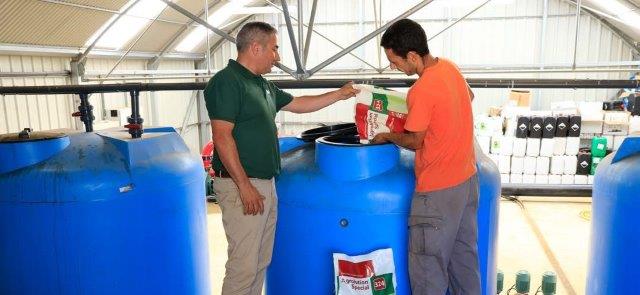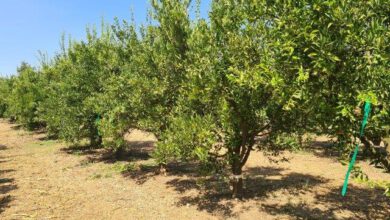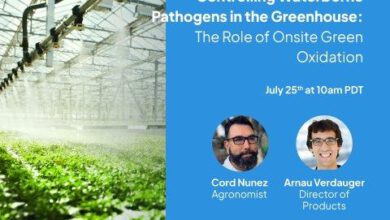Increasing the Resilience of Indoor Farming Systems

“I use Agrolution because it’s a complete fertilizer solution. I’ve reduced nitrous oxide emissions, saved time, and there’s less hassle so I don’t make mistakes preparing the water-soluble nutrient solutions." Mr. Roberto Bogoni of the Soc. Agr. Bogoni e Bragolin 12 hectares strawberries and vegetables in Buttapietra, Italy.
Gali Carmi, ICL Agronomist, Gali.Carmi@icl-group.com, www.icl-growingsolutions.com
Conventional agriculture faces many challenges, including the availability of land, unpredictable weather patterns, and problems resulting from soil pests and diseases. In response to these challenges, Indoor Farming, or Controlled-Environment Agriculture (CEA), is emerging as a promising, revolutionary approach.
Indoor farming options
Indoor farming is an umbrella term that describes farming systems where plants are grown inside, in a closed environment. Indoor farming includes hydroponic and vertical farming systems where inert substrates are used instead of soil, and a fertigation solution delivers the entire nutritional needs of the crops. Using fertigation and inert substrates means growers can precisely control the nutrients in the crops’ root zone. But that is not the only benefit.
Replacing the soil with an inert substrate overcomes soil diseases and pests which would have required chemical control in conventional soil-based cultivation systems. In addition, indoor farming makes it possible to grow crops out-of-season thanks to the complete climatic control growers have over the farming environment.
The optimum nutrition that indoor farming delivers to crops increases yields while at the same time reducing nutrient losses and hence, increasing sustainability. But to achieve this effectively, advanced control systems are required.
The crops are totally dependent on the nutrients provided by fertigation, as the inert substrate has limited nutrient storage. The plants cannot tolerate errors, so the systems are sensitive. Any deviation from the optimum nutrition can significantly impact the crop’s yield.

Critical nutrient management
Ensuring optimum fertigation management in hydroponic and vertical farming systems is critical. Because of this sensitivity, research has focused on finding the optimum nutrient solutions for different crops at each growing stage (establishment, vegetative growth, and production).
When designing a fertigation program for an indoor farming system, it is essential to consider the characteristics of the irrigation water and the nutrient needs of the crop.
Irrigation water properties
Water analysis is essential. It informs the grower which nutrients are already in the irrigation water. The nutrients typically found in irrigation water are calcium (Ca), magnesium (Mg), chloride (Cl), and bicarbonate (HCO3–). To design the best strategy for the conditions, it is also essential to know the pH level of the water. For example, if the water’s pH and bicarbonate levels are high, the grower must choose fertilizers with an acidifying effect. These will help neutralize the bicarbonates and reduce the pH of the water.
Crop’s nutrient demands
Different crops have different demands throughout their growing cycle. Knowing the crop’s needs allows growers to create precise fertilization plans to deliver optimum growth at every stage, leading to improved yields.
Selection and monitoring of fertigation systems
Devising the fertigation strategy based on the crop and conditions is just part of the equation. When choosing an irrigation system, systems with a continual flow of fertilizers are ideal. Then once set up, one of the biggest challenges in hydroponics and vertical farming is the management of the concentration of the nutrients in the solution next to the roots. The crop demand will indicate the level of nutrients required at each growth stage, and the grower must now monitor the nutrient solution to ensure the system meets the crop’s needs.
Electrical conductivity to determine the nutrient concentration
Electrical conductivity (EC) is an index of the salt concentration of nutrients. The EC can be used to evaluate the nutrient status in the feed solution before fertigation. The EC also indicates the total level of nutrient ions available in the fertigation solution next to the root zone.
Growers can use EC values to monitor the fertigation system and determine if the crop is in deficit or surplus according to the planned fertilizer program and the crop demands.
Role of acidity
To ensure the optimal absorption of nutrients by crops, the acidity of the nutrient solution needs to be between 5.5 and 6.5. A system with appropriate sensors can alert growers to abnormal irrigation water acidity or electrical conductivity to ensure issues are promptly and effectively remedied before crop growth or yield suffers.
Fertilizer solubility and choice
Having set up the irrigation system, determined the strategy required to meet the crops’ needs, and configured the monitoring systems, the final but crucial piece of the puzzle is to choose the correct fertilizers.
As we have discovered, fertigation systems must run smoothly and rely on continuous monitoring to ensure the crops have the nutrients they require to thrive. Any blockages in the system or sediments obstructing the sensors can quickly become major issues. That is why choosing high-quality fertilizers with high solubility is vital for these indoor farming systems. Using high-quality fertilizers guarantees stable fertigation solutions, free from sediments that may damage or interfere with the sensitive sensor systems.
Agrolution for your agricultural solution
Agrolution is a range of water-soluble fertilizers created by ICL. Agrolution fertilizers are ideal fertilizer solutions for hydroponic and vertical farming systems, with products designed for hard or soft water situations. Agrolution provides the full complement of essential nutrients crops need while keeping irrigation systems clean. Agrolution Special is fully soluble, developed for soft water, ideal for chloride-sensitive crops, covers all crop growth stages, and creates the best conditions for growing vegetable crops.
Meanwhile, Agrolution pHLow is perfect for growers who have to deal with high alkalinity in their irrigation water. The acidic nature of Agrolution pHLow means that all the nutritional elements dissolve more efficiently, even in hard water, and the drip lines are kept free of limescale build-up. It is made of the purest ingredients, and all trace elements in the fertilizer are chelated. And unlike liquid mineral acids, Agrolution pHLow is a granular water-soluble product making it safe to handle.
Using high-quality, high-purity water soluble fertilizers simplifies the running of indoor, controlled-environment agriculture systems allowing growers to concentrate on reaping the greatest rewards from these promising revolutionary farming systems.




